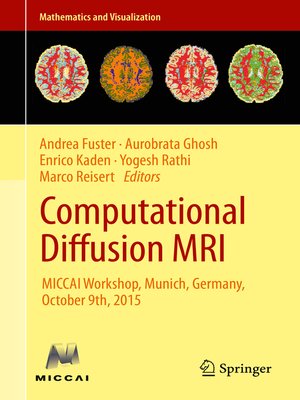Computational Diffusion MRI
ebook ∣ MICCAI Workshop, Munich, Germany, October 9th, 2015 · Mathematics and Visualization
By Andrea Fuster

Sign up to save your library
With an OverDrive account, you can save your favorite libraries for at-a-glance information about availability. Find out more about OverDrive accounts.
Find this title in Libby, the library reading app by OverDrive.



Search for a digital library with this title
Title found at these libraries:
| Library Name | Distance |
|---|---|
| Loading... |
These Proceedings of the 2015 MICCAI Workshop "Computational Diffusion MRI" offer a snapshot of the current state of the art on a broad range of topics within the highly active and growing field of diffusion MRI. The topics vary from fundamental theoretical work on mathematical modeling, to the development and evaluation of robust algorithms, new computational methods applied to diffusion magnetic resonance imaging data, and applications in neuroscientific studies and clinical practice.
Over the last decade interest in diffusion MRI has exploded. The technique provides unique insights into the microstructure of living tissue and enables in-vivo connectivity mapping of the brain. Computational techniques are key to the continued success and development of diffusion MRI and to its widespread transfer into clinical practice. New processing methods are essential for addressing issues at each stage of the diffusion MRI pipeline: acquisition, reconstruction, modeling and model fitting, image processing, fiber tracking, connectivity mapping, visualization, group studies and inference.This volume, which includes both careful mathematical derivations and a wealth of rich, full-color visualizations and biologically or clinically relevant results, offers a valuable starting point for anyone interested in learning about computational diffusion MRI and mathematical methods for mapping brain connectivity, as well as new perspectives and insights on current research challenges for those currently working in the field. It will be of interest to researchers and practitioners in the fields of computer science, MR physics, and applied mathematics.







